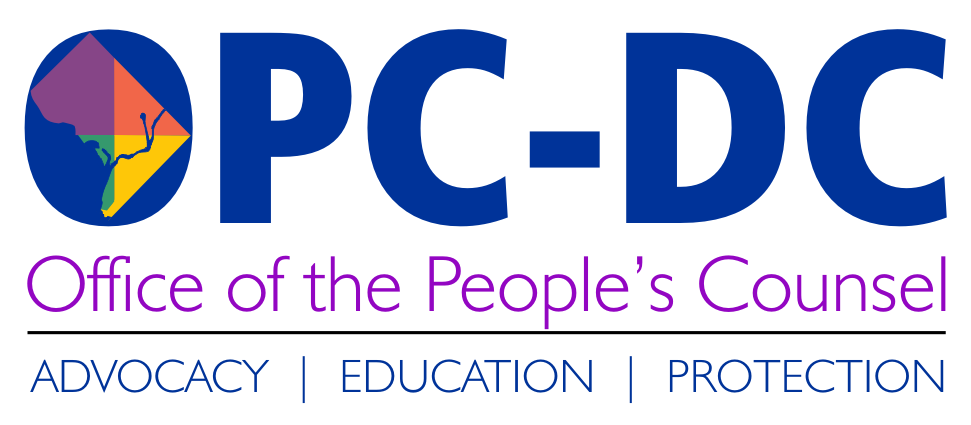April 22, 2022
OPC Combating Climate Change with Equity in Electrification
By Sandra Mattavous-Frye
People’s Counsel for the District of Columbia
The Office of the People’s Counsel (OPC) is pleased to observe Earth Day, April 22, 2022, by highlighting a recent study OPC commissioned:
Equity Assessment of Electrification Incentives in the District of Columbia.
OPC has long been at the forefront of initiatives that foster a clean and healthy environment. Now, unrelenting climate change necessitates a laser focus on how to quickly move the needle forward. District residents need easy access to ways to power and heat their homes, ride public transportation, and drive without adding to the pollution that causes climate change. Equally alarming and demanding attention is the impact of environmental injustice on the District’s most vulnerable communities. The 2022 Earth Day theme is “Invest in Our Planet.” To invest in our planet, we need to invest in climate change solutions that benefit underserved communities so that all District communities can thrive.
How can we best combat climate change? How can we make sure climate solutions are just, equitable, affordable, and resilient? One potential pathway is “electrification,” switching energy and transportation systems to electricity powered by “green” energy sources to reduce climate change emissions and other air pollution, and to transition away from burning fossil fuels.
Because equity must be a central driver of any climate change plans, OPC commissioned an Equity Assessment of Electrification Incentives in the District of Columbia. The
study by Applied Economics Clinic (AEC) found that about 27% of the District’s population resides in a so-called “environmental justice community.” They are more likely to be near environmental hazards, are disproportionately exposed to air pollution, and bear the brunt of climate change. Low-income residents in the District are also more likely to face a “severe” energy burden—the percentage of household income spent on energy costs. One in 14 District residents are “severely” energy-burdened, meaning they pay more than 10 percent of their income in energy costs.
To help ensure that any climate change solutions also address environmental injustice, the study examined the distribution of existing programs that promote electrification and made key recommendations to ensure future investments in electrification equitably benefit District communities, including vulnerable neighborhoods. AEC identified priorities that should influence decision-making, including community engagement and ensuring that electrification programs do not make energy bills more unaffordable for consumers who already face a high energy burden. Programs should prioritize the most equitable funding sources, including federal funding, grant funding, regional funding, and taxpayer funding instead of utility bill surcharges requiring low- and moderate-income residents to fund programs through increases in their energy bills.
There are no easy answers to combating climate change but there are solutions that can help make our communities stronger and healthier. All of us must do our part to advance these solutions. And consumers must fully participate in opportunities that bring them to the table to contribute their ideas and express their concerns.
OPC’s website,
Opc-Dc, has information on how to reduce your energy use, conserve water, and learn more about District government decisions affecting climate change solutions. Sign up there for the OPC Connection, our monthly newsletter and we’ll keep you informed on key developments. Rest assured, OPC will continue to proactively address these important issues as we advocate, educate, and protect DC consumers.
Who We Are
The Office of the People's Counsel is an independent agency of the District of Columbia government. By law, OPC is the advocate for District consumers of electric, water, natural gas, and telephone services. The Office's mandate is to advocate for the provision of safe and reliable utility service at rates that are just, reasonable, and nondiscriminatory; to assist individual consumers in disputes with utility companies; and to provide technical assistance and consumer education to the community and stakeholders. OPC carries out its mission through the work of the following divisions.
The Climate Action Division works to ensure that OPC is effectively incorporating District of Columbia sustainability and climate goals into all aspects of our education, outreach, and advocacy. People’s Counsel Sandra Mattavous-Frye launched this Division in 2020 to ensure climate action policy considerations are an integral part of OPC’s operations at a time when climate change threatens the future of our world as we know it.
The Litigation Services Division represents consumers in legal matters involving utility companies before the DC Public Service Commission, federal regulatory agencies, and the DC Court of Appeals; and engages in diverse energy, telecommunications, technical, and market monitoring functions.
The Consumer Services Division provides education and outreach to consumers on utility and energy issues; assists in the resolution of consumer complaints; and provides technical assistance to lay advocates seeking to participate in the regulatory process.
The Water Services Division serves as a voice for water consumers by investigating complaints related to DC Water services, rates, and billing; represents ratepayers at DC Water administrative hearings and rulemaking proceedings, as well as the DC Court of Appeals; and educates water consumers about their legal rights and responsibilities.
Contact Information:
Phone: (202) 727-3071
Email:
info@opc-dc.gov
Website:
Opc-Dc
Twitter & Instagram: @DCOPC
Facebook.com/DCPeoplesCounsel
